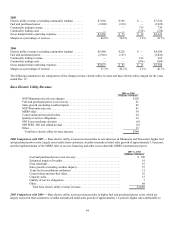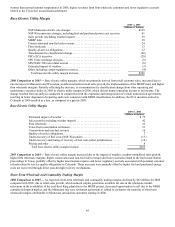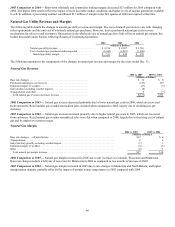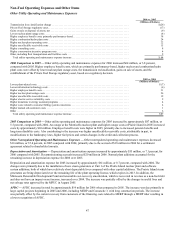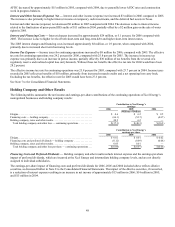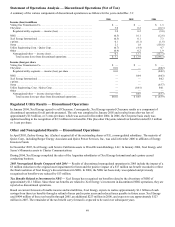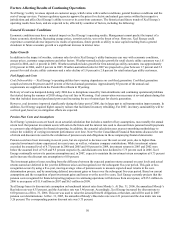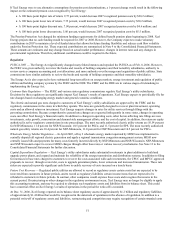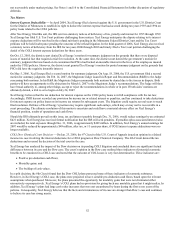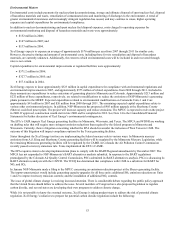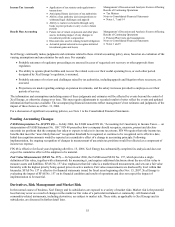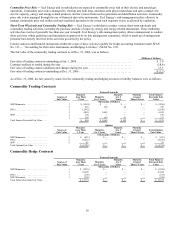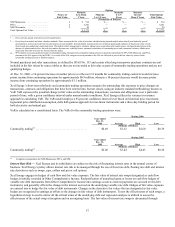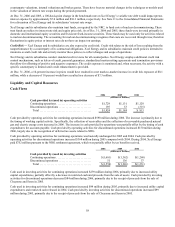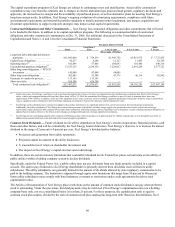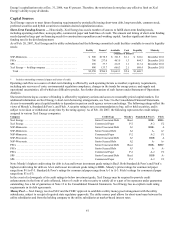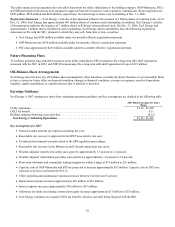Xcel Energy 2006 Annual Report Download - page 64
Download and view the complete annual report
Please find page 64 of the 2006 Xcel Energy annual report below. You can navigate through the pages in the report by either clicking on the pages listed below, or by using the keyword search tool below to find specific information within the annual report.
54
• Xcel Energy is participating in a voluntary carbon management program and has established goals to reduce its volume of
carbon dioxide emissions by 12 million tons by 2009, and to reduce carbon intensity by 7 percent by 2012.
• In certain regulatory jurisdictions, Xcel Energy uses an evaluation process for future generating resources that incorporates the
risk of future carbon limits through the use of a carbon cost adder or externality costs.
• PSCo is in the process of developing an IGCC plant that generates electricity using gasified coal and will be the first plant of
its kind to capture and sequester a portion of the carbon dioxide generated by the plant.
• Xcel Energy is the largest retail provider of wind generated energy in the nation and continues to grow its wind portfolio.
• Xcel Energy is involved in initiatives to manage carbon dioxide, including the use of biosequestration and the study of
geological sequestration.
• Xcel Energy continues to develop and expand its customer conservation and demand side management programs.
• Xcel Energy is working with public policy makers to support the development of a national climate policy to require the
deployment of electric generation technology that emits little or no carbon dioxide.
Xcel Energy believes that it is well positioned for a variety of possible outcomes.
Impact of Nonregulated Investments
In the past, Xcel Energy’s investments in nonregulated operations had a significant impact on its results of operations. As a result of
the divestiture of NRG and other nonregulated operations, Xcel Energy does not expect that its investments in nonregulated operations
will continue to have a significant impact on its results.
Inflation
Inflation at its current level is not expected to materially affect Xcel Energy’s prices or returns to shareholders.
Critical Accounting Policies and Estimates
Preparation of the Consolidated Financial Statements and related disclosures in compliance with GAAP requires the application of
accounting rules and guidance, as well as the use of estimates. The application of these policies necessarily involves judgments
regarding future events, including the likelihood of success of particular projects, legal and regulatory challenges and anticipated
recovery of costs. These judgments could materially impact the Consolidated Financial Statements and disclosures, based on varying
assumptions. In addition, the financial and operating environment also may have a significant effect on the operation of the business
and on the results reported even if the nature of the accounting policies applied have not changed. The following is a list of accounting
policies that are most significant to the portrayal of Xcel Energy’s financial condition and results, and that require management’s most
difficult, subjective or complex judgments. Each of these has a higher potential likelihood of resulting in materially different reported
amounts under different conditions or using different assumptions. Each critical accounting policy has been discussed with the audit
committee of the Xcel Energy board of directors.
Accounting
Policy
Judgments/Uncertainties
Affecting Application See Additional Discussion At
Regulatory Mechanisms and
Cost Recovery
• Anticipated future regulatory decisions and their
impact
• External regulatory decisions, requirements and
regulatory environment
• Impact of deregulation and competition on
ratemaking process and ability to recover costs
Management’s Discussion and Analysis: Factors Affecting
Results of Continuing Operations
• Regulation
Notes to Consolidated Financial Statements
• Notes 1, 12, 13, 14 and 16
Nuclear Plant
Decommissioning and Cost
Recovery
• Costs of future decommissioning
• Availability of facilities for waste disposal
• Approved methods for waste disposal
• Useful lives of nuclear power plants
• Future recovery of plant investment and
decommissioning costs
• Re-licensing of nuclear plants impact on
decommissioning costs
Notes to Consolidated Financial Statements
• Notes 1, 14 and 15


